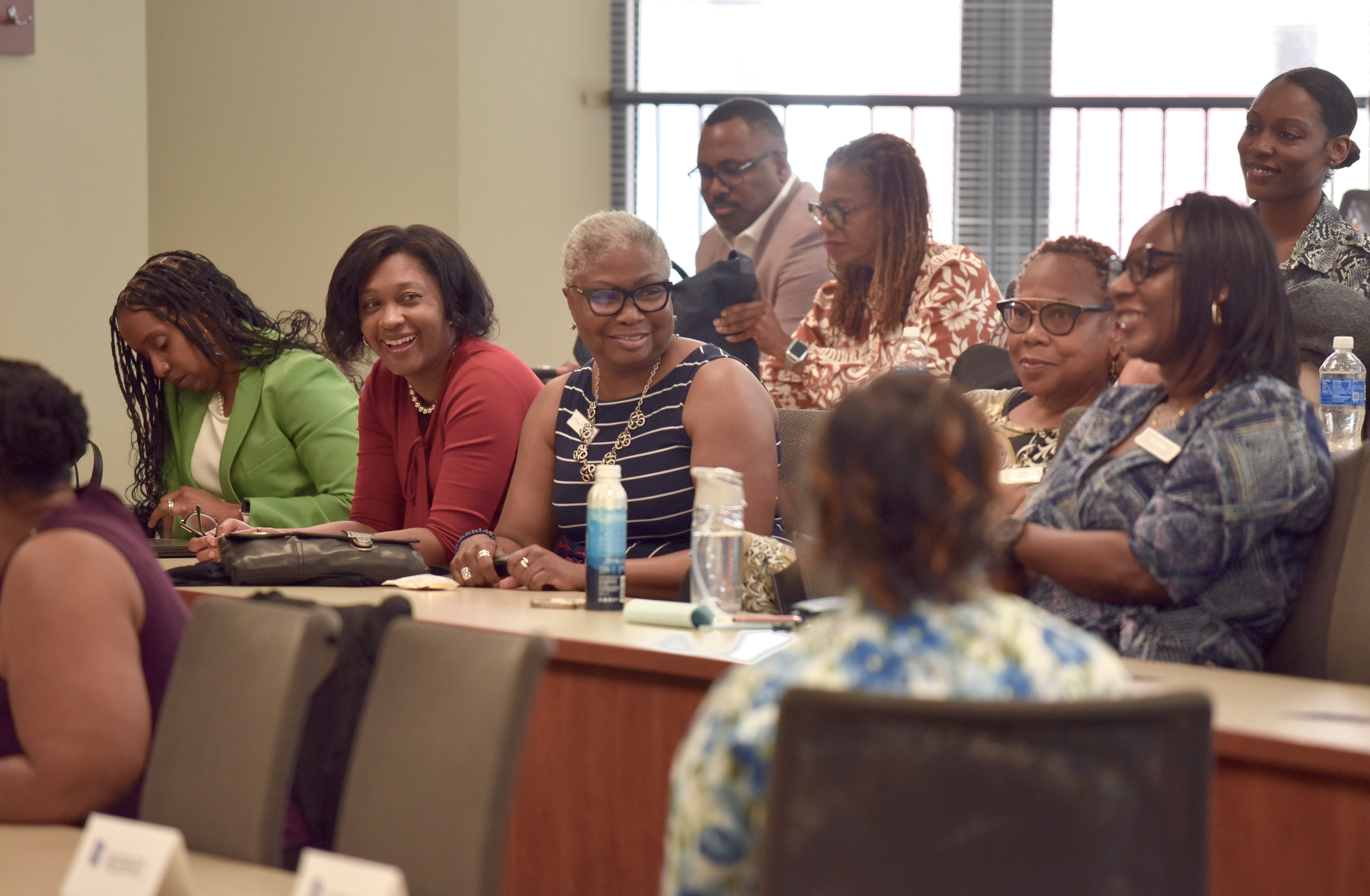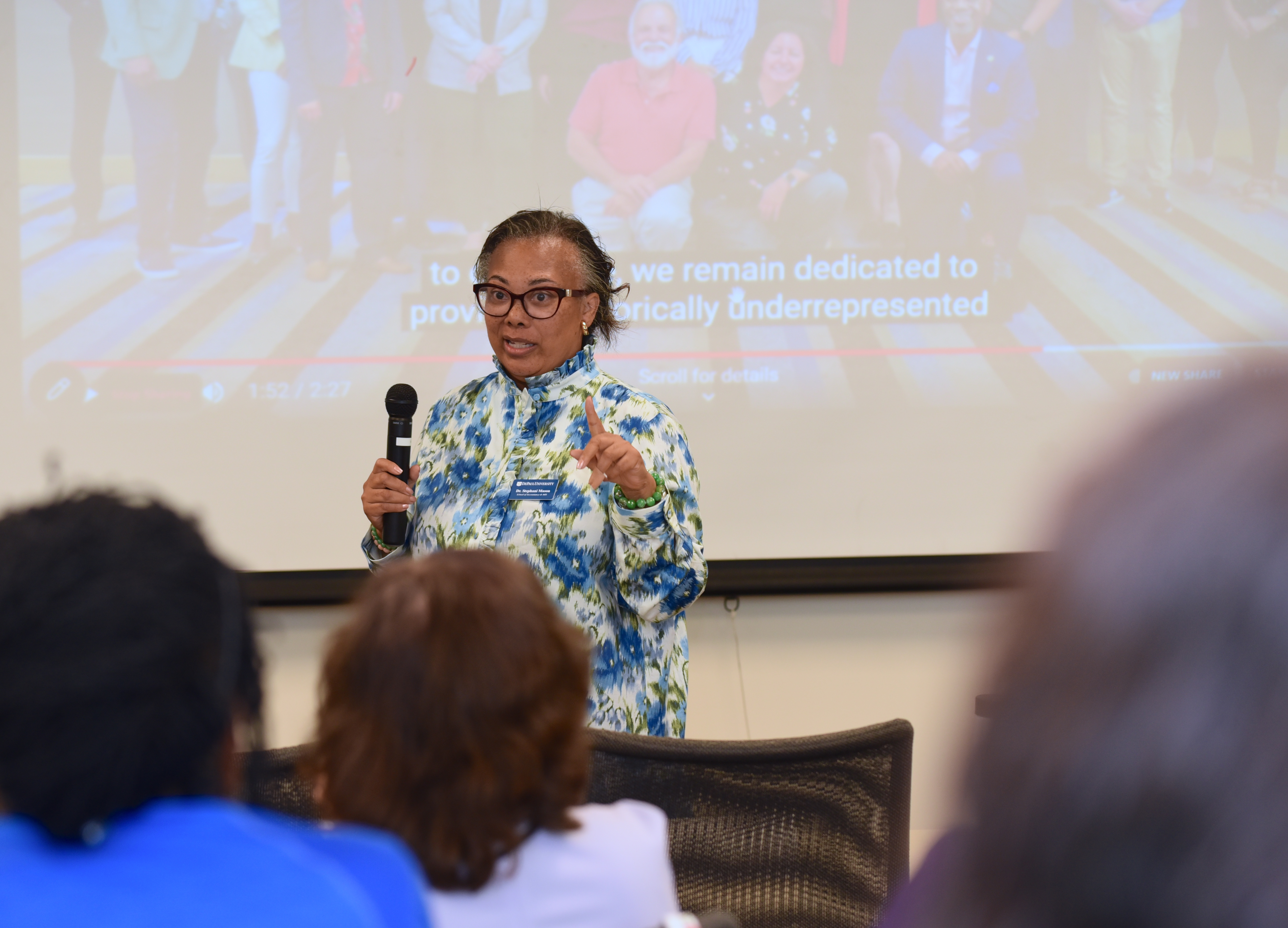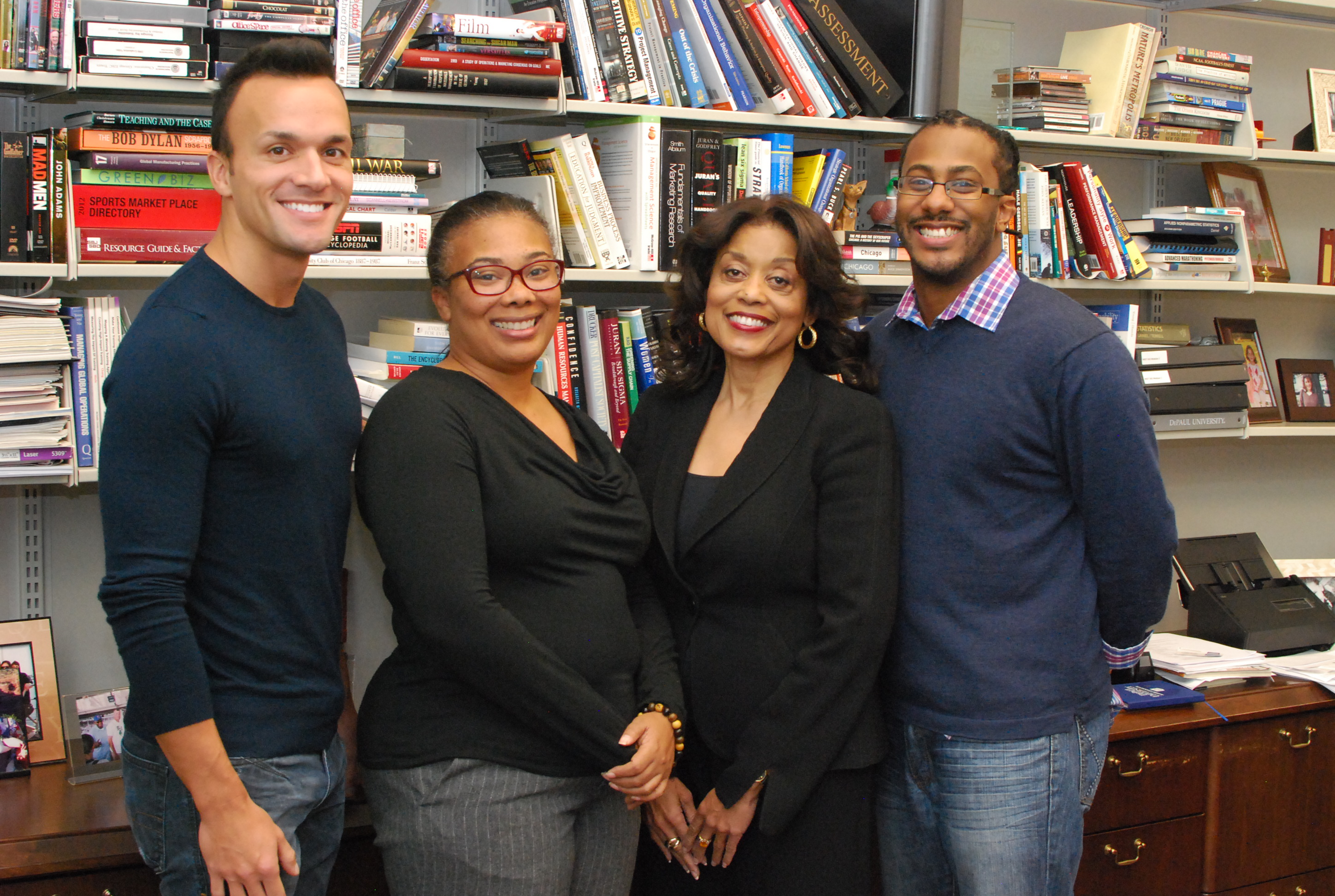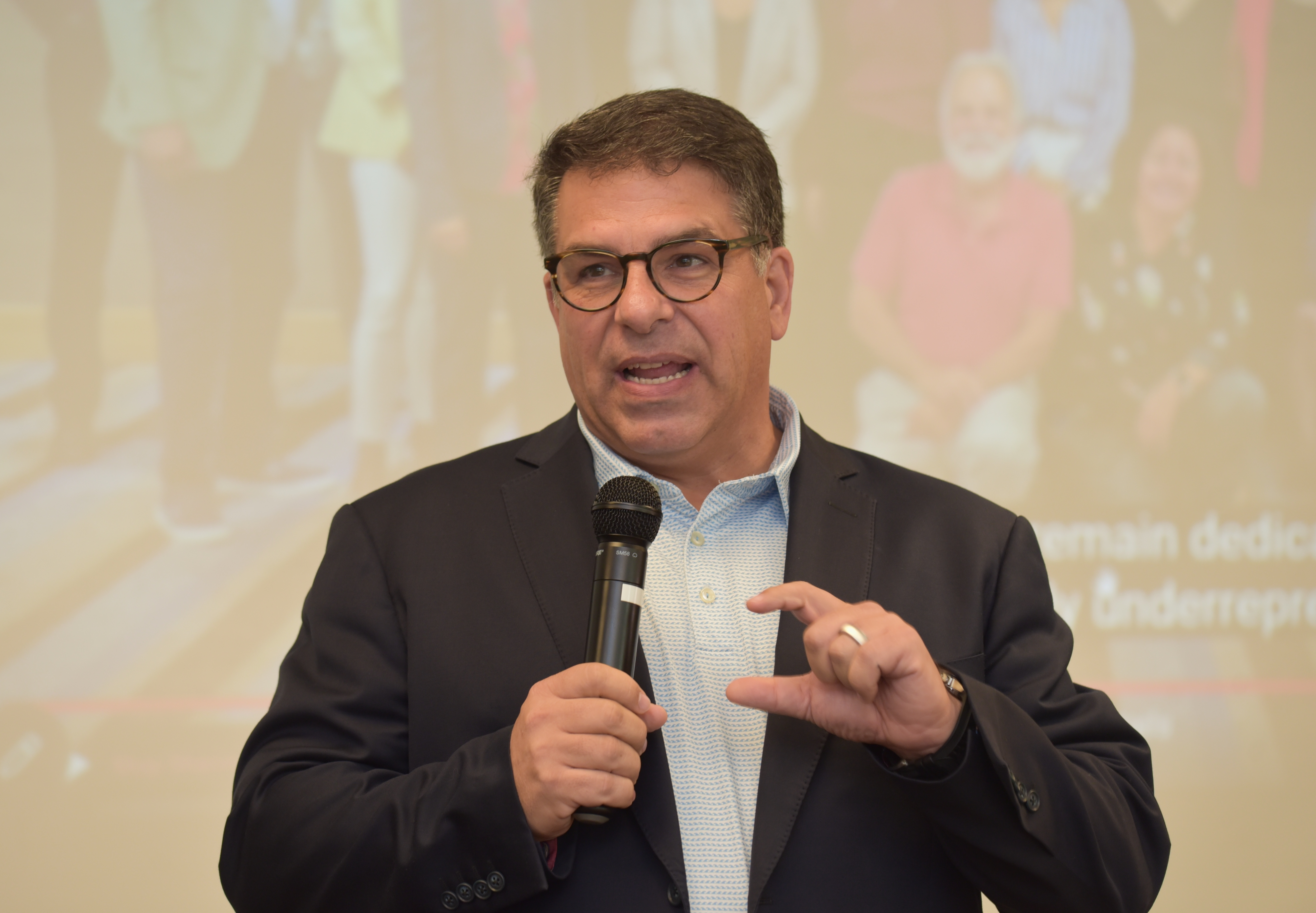 Attendees of the 30th anniversary celebration of The PhD Project. The celebration and conference were held at Driehaus on August 7.
Attendees of the 30th anniversary celebration of The PhD Project. The celebration and conference were held at Driehaus on August 7. On Wednesday, August 7, more than 70 academic and business leaders gathered at DePaul’s Driehaus College of Business to celebrate 30 years of
The PhD Project. The mood? Equal parts academic conference and family reunion.
“I’ve done some press in advance of this event,” said Associate Professor of Accountancy Stephani Mason, a PhD Project alumna and a DePaul professor who was heavily involved in organizing the event, “and I keep getting asked, ‘What does the PhD Project mean to you?’ My answer, in a word: Family.”
From a Few Mentors to an Exponential Impact: The PhD Project Family Tree
The PhD Project, founded in 1994, aims to diversify the world of business. The initiative does so by giving Black/African American, Latinx/Hispanic American, and Native American business professionals and students the mentorship and resources they need to earn business PhDs and pursue careers in the academy. There, in turn, they can become mentors for the next generation of BIPOC leaders in business and in business education.
DePaul has close ties to The Project. The late Sandra Shelton, who served as the KPMG/Neil F. Casson Endowed Professor of Accountancy at DePaul, was the first PhD Project member to be capped as new faculty that year. She went on, during her time at DePaul, to inspire and mentor countless others. Shelton also served as a long-standing member of The Project’s annual conference planning committee.
Among them? Mason, as well as the Dr. Barry Jay Epstein Endowed Professor of Accounting Kelly Richmond Pope and Associate Professor of Marketing Jim Alvarez Mourey. All three are PhD Project alumni.
 Associate Professor Stephani Mason welcomes attendees to the celebration and conference.
Associate Professor Stephani Mason welcomes attendees to the celebration and conference.“I have been fortunate in that, in the years I have been at DePaul, I have been in a department with, at one point, five PhD Project members,” said Mason. “That is not an inconsequential number.”
Indeed, over the past thirty years, the number of Black/African American, Latinx/Hispanic American, or Native American business school faculty has increased from just 294 to more than 1,700: a sixfold increase. The PhD Projects now counts 10 college presidents and 89 deans among its alumni, who are spread out across a total of 670 campuses nationwide.
Passion and Connection: Insights from the Conference
 Alvarez Mourey, Mason, Shelton, and Willy Reddic, then of DePaul University, now Associate Dean for Business Education at Syracuse. All four participated in The PhD Project. Throughout the afternoon of the conference, panel sessions bridged expertise from the classroom with experience from the boardroom.
Alvarez Mourey, Mason, Shelton, and Willy Reddic, then of DePaul University, now Associate Dean for Business Education at Syracuse. All four participated in The PhD Project. Throughout the afternoon of the conference, panel sessions bridged expertise from the classroom with experience from the boardroom.
Pope shared how her career trajectory took her from working in accounting to working in academia to producing an award-winning documentary, All the Queen’s Horses, about the largest case of municipal fraud in American history. It’s a path, she stressed, that stemmed from her belief in the power of storytelling to engage audiences.
Janine Sanders Jones, Associate Dean for Faculty Scholarship, Teaching, and Service Excellence at the University of St. Thomas, shared her experience developing a business-school-specific institute that trains faculty to create inclusive classroom environments.
“What are you doing in the classroom that could potentially signal to a student that they don’t belong? Or that they’ll get a different experience than others?” she advises faculty to ask themselves. “Get to know your students. Not just their name but their stories.”
Alvarez Mourey shared how similar considerations informed the creation of Business 101, part of the award-winning core curriculum at Driehaus.
“We designed the class to give students a taste of each discipline. We can’t assume students have background knowledge” about their options within the world of business, he said. “As a first-generation college student, I definitely didn’t know about all the majors available to me.”
“It’s not enough to bring our students in,” he added. “It’s our job to set them on a path to a career.”
Amidst a Fraught Environment, a Commitment to DEI for the Long Haul
The conference and celebration took place in an increasingly fraught environment for diversity, equity, and inclusion initiatives in higher education. State legislatures have curtailed such initiatives, or even banned them outright.
The conference brought this context to the fore — and gave attendees the chance to process it. Some shared advice, such as finding allies in other faculty. Others simply took the chance to feel, collectively, the impact of the backlash to DEI. That backlash, as one participant noted, has already jeopardized what is, for many, their “life’s work.”
In his opening remarks, DePaul President Robert L. Manuel re-affirmed the university’s longstanding commitment to fostering an inclusive environment that advances equity and nurtures diversity.
 DePaul President Rob Manuel addresses the audience.
DePaul President Rob Manuel addresses the audience. “Because of our faith tradition, we have an opportunity that other institutions may not,” he stressed — an opportunity, he continued, to act as a leader in cultivating conversations around the value of DEI.
“I know this is not always easy work,” he added. “But it is vital to meeting the needs of our students. It is vital to our survival.”
“Faculty diversity is critical if you want to be an institution that’s doing what universities are supposed to do: producing first class scholarship research, contributing to the production of knowledge that is going to make the world a better place, and preparing the young people who are going to lead us into tomorrow," said Dr. Cecilia Conrad, CEO of Lever for Change.
In this conversation, as in many others, Mason’s opening words about the project providing “family” rung particularly true.
“The PhD Project has given me people who will celebrate my accomplishments,” she said. “But perhaps more importantly: When times get rocky, as they always do, you know that there’s a group of people for you to tap into.”
Mason’s advice to her academic family? “Remind yourself who you are. And remind yourself whose you are.”